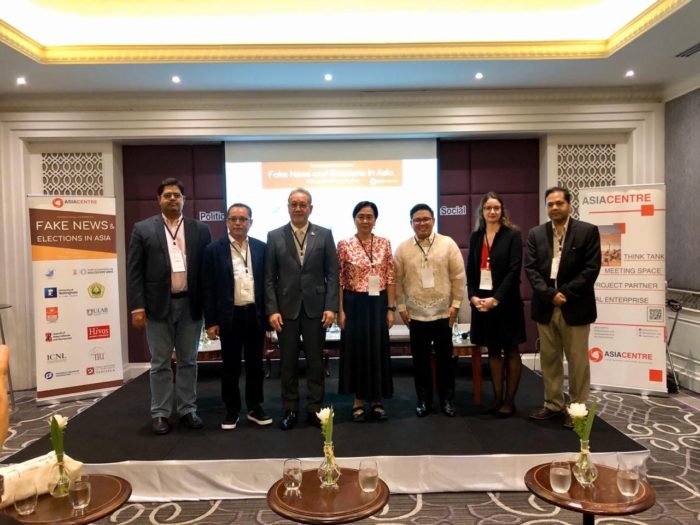
How do political parties and political leaders respond to the spread of disinformation in the digital age?
This was the key question that the Council of Asian Liberals and Democrats (CALD) attempted to address in the panel it organized during the International Conference on Fake News and Elections that took place on 10-12 July 2019 in Bangkok, Thailand. Spearheaded by the Asia Centre, the conference featured 13 panels, 46 presentations and over 80 participants who discussed the different facets of fake news, its impacts, as well as the possible solutions to it. (See programme)
CALD opened the conference on 10 June with the panel, “Politics in the Age of Disinformation: Parties, Elections and Social Mobilization”, with incumbent and former parliamentarians from Thailand, Indonesia and Hong Kong as speakers. In their presentations, they tackled how information and communication technologies have become instruments to create, distribute and amplify fake news, and how these, in turn, undermine the very foundations of democratic society. They also discussed how liberal and democratic political parties and political leaders should respond to fake news, knowing fully well that they are the usual targets of disinformation campaigns, particularly during elections.
“One possible response to fake news is legislation, particularly in terms of promoting explainable algorithms, creating internet codes, and instituting oversight with teeth”, said Kiat Sittheeamorn, member of Thailand’s House of Representatives and former CALD Secretary General. He cautioned, however, that “legislation should be based on good governance principles and on liberal and democratic values as we do not want the cure to be worse than the disease.”
Drawing from his political party’s experience in the last April 2019 Indonesian elections, Deddy Sitorus, member of the country’s House of Representatives, claimed that the political opposition employed a “firehose of falsehood” against incumbent President Joko Widodo. Defined as “propaganda based on broadcasting message rapidly, repetitively, and continuously over multiple channels without regard for truth of consistency”, this political strategy was countered by fact-checking done by media organizations. Through this, he said that, “people can see from both sides and understand whether the news or information that they get before is valid or not.”
Whereas disinformation figured prominently in Thailand and Indonesia, particularly in their recent elections, Emily Lau, former member of Hong Kong’s Legislative Council, said that, “fake news is not a big issue yet in Hong Kong primarily because we do not have general elections.” She added: “Our more pressing problem is self-censorship induced by Beijing’s control of mainstream news media, particularly free-to-air television which commands the largest number of viewers.”
On 11-12 July, a dozen panels discussed how hate speech and violence could be traced to fundamental ethnic, religious and political differences, and how digital disinformation affected countries as diverse as Australia, Bangladesh, Cambodia, Estonia, Japan, India, Indonesia, Malaysia, Myanmar, Pakistan, Philippines, Singapore, Sri Lanka, South Africa, Taiwan, Thailand, United Kingdom and United States of America. One major bone of contention was whether new legislation is needed to counter fake news, or existing libel, slander and defamation (tort) law would be enough. Given the weakness of judicial institutions and the rule of law in many countries in Asia, the participants also expressed concerns that government authorities might just use fake news laws to silence the political opposition and other critics.
“Disinformation affects not only politics but the society at large”, said Sittheeamorn. “Given the wide-ranging scope of the problem, the possible solutions should also mobilize all stakeholders – the international community, government institutions, civil society organizations, the media, tech and social media companies, educational institutions, even the family. A consolidated, multi-sectoral response might be the only way to effectively address fake news which plagues many countries in Asia and beyond.” |
Categorised in: News Article
This post was written by CALD
 Unit 409, 4/F La Fuerza Plaza 2, 2241 Don Chino Roces Ave. corner Sabio St., 1231 Makati City, Philippines
Unit 409, 4/F La Fuerza Plaza 2, 2241 Don Chino Roces Ave. corner Sabio St., 1231 Makati City, Philippines
 +632 8819 60 71
+632 8819 60 71
 info@cald.org
info@cald.org